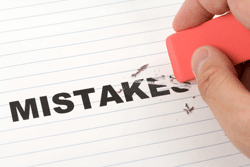Last updated: Oct. 30, 2013
 As a small business owner you’re faced with many rules and regulations, not just government, but also for your specific trade or profession. It can often be overwhelming trying to keep track of all the requirements.
As a small business owner you’re faced with many rules and regulations, not just government, but also for your specific trade or profession. It can often be overwhelming trying to keep track of all the requirements.
Here’s a short list of 5 things that you can be aware of to ensure you meet CRA’s requirements for your taxes.
1. Not saving receipts of less than $50
People sometimes get excited when they hear that the CRA doesn’t require receipts for meal and entertainment expenses of less than the prescribed daily rate. Don’t fall into this trap.
You may not need the receipt, but you still need to have some sort of record documenting where you went, when, who you were with, the business purpose of the meal or event and the business relationship between you and the people you were with.
When you look at the list of requirements, what could be better for documentation than the receipt?
In most cases, the receipt will already have printed on it the name and address of the restaurant and the date and time you were there. All you have to do is write on the slip who you were with and what the business relationship and purpose was of the event.
While a receipt may not be required, for many people hanging onto the receipt is going to be easier than keeping an entirely separate log of the expense information.
2. Lumping equipment with supplies
Equipment is a capital expenditure, and capital expenditures have to be depreciated.
Special rules do allow most small businesses to write-off a reasonable (immaterial) amount in capital expenditures for tangible property (such as tools and supplies) in the year it is purchased. However, you still have to report these purchases as capital expenditures and add them to Class 12 and then expense the cost.
What if you don’t report the purchases properly and instead just deduct expenses?
The CRA could rule that you improperly characterized the expense and are not entitled to the deduction you claimed.
3. Forgetting to track reimbursable expenses
Many small-business owners pay for some business expenses with cash out of their own pocket or through a personal credit card. That’s fine.
The mistake is if you don’t track those costs and submit the expenses to your company for reimbursement. Also, the company must have an established plan that does deduct the expenses and enables reimbursements to be non-taxable to employees.
But if you don’t keep track of and substantiate the expenses, you could be denied the deduction for your business.
4. Miscalculating automobile deductions
Part of the problem here is that there are many ways to calculate deductions for business use of a car. Here are some brief guidelines that can help you:
- Some businesses take a standard mileage deduction per business mile, or some take a deduction for actual expenses, including depreciation of the car.
But technically only one method is actually allowed by the CRA … and that is actual expenses. - If the car is owned by the corporation, 100% of the costs can be deducted. However, any personal use of a business vehicle by an employee has to be included as taxable income to the employee.
5. Giving more than you can receive, tax-wise
It seems like every year we see at least one small business saying that it had a couple thousand dollars in deductible business gifts in the previous year. We classify those as promotion expenses.
There is no problem with gifts to clients and business associates, but a four-figure deduction for gifts gets CRA’s attention.
The CRA allows you to deduct a reasonable portion of gifts to any individual/business per year. So gifts in the thousands of dollars in deductions would mean that we would be required to document what we received in return for that gift.
Your tax professional should keep track of all these rules and regulations so you don’t have to. However, your tax professional will still rely on you to provide the appropriate records and documentation to ensure you meet all the requirements set by CRA.